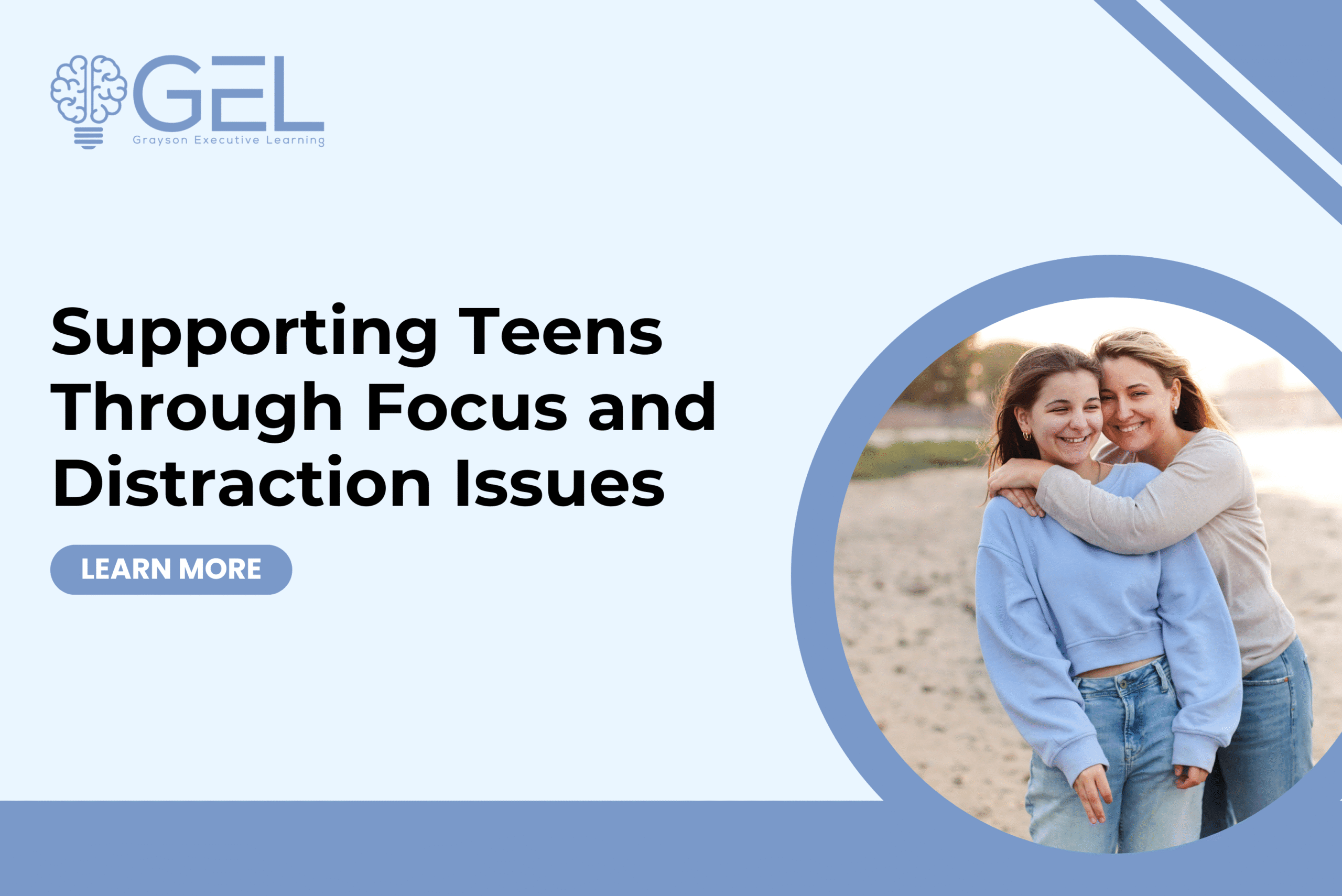If your teen constantly loses track of what they are doing, forgets instructions seconds after hearing them, or struggles to finish assignments they start, you are not alone. Many parents face the same challenges and often wonder if it is motivation, behavior, or something deeper. Focus and distraction issues in teens, especially those with ADHD or executive function difficulties, are common and manageable with the right support.
In this blog, we will break down why focus is so difficult for many teens, what science says about attention and distraction, and what parents can do to guide their teens toward better concentration and self-regulation.
Why Focus Is So Hard for Today’s Teens
Teenagers live in a world of constant sensory input: texts, notifications, social media, assignments, responsibilities, and emotional pressures. For teens with ADHD or executive function challenges, their brains are even more prone to distraction. According to research from CHADD (Children and Adults with Attention-Deficit/Hyperactivity Disorder), teens with ADHD are more likely to experience inconsistent attention, impulsivity, and difficulty sustaining mental effort on non-stimulating tasks.
But even without a diagnosis, many teens struggle to manage their attention. The prefrontal cortex, which governs focus, planning, and goal setting, is still developing well into the mid-twenties. This means focus is a skill in progress, not a fixed trait.
Signs Your Teen Is Struggling With Focus
You might notice:
- Taking hours to finish short assignments
- Constantly checking devices or drifting during tasks
- Trouble starting work without repeated prompting
- Zoning out in conversations
- Forgetting or skipping instructions
These are not always signs of laziness. They are often signs of an overworked or overwhelmed brain struggling to stay engaged.
Teach Teens How Attention Works
Many teens do not understand how their brains handle focus. Explain that attention is like a spotlight. It can be moved and trained, but it requires energy and direction. Help them:
- Identify peak focus times (usually mid-morning or early evening)
- Notice what pulls their attention off-task
- Set daily intentions for what they want to stay focused on
Understanding attention builds awareness, which is the foundation for change.
Build Distraction-Free Study Zones
The environment makes a major difference. Help your teen set up a dedicated workspace with limited distractions. Try:
- Removing phones or using focus apps like Forest or Freedom
- Using noise-canceling headphones or white noise
- Keeping only materials related to the current task in sight
According to the American Psychological Association, students perform better in environments with minimal visual and auditory distractions.
Use Timed Work Sessions and Breaks
Teens with focus issues benefit from structure. Rather than telling them to “just study,” introduce the Pomodoro Technique:
- 25 minutes of focused work
- 5-minute break
- Repeat 3 to 4 cycles, then take a longer break
This system builds stamina over time. Use timers or visual countdowns to signal when it is time to switch.
Break Big Tasks Into Mini Goals
Overwhelm is a common cause of distraction. When tasks feel too large, teens disengage. Break homework or projects into smaller, manageable parts:
- Read one chapter
- Summarize five key points
- Answer three questions
Then pause for feedback or a check-in. Small wins help build momentum and reduce avoidance behaviors.
Reduce Multitasking and Media Use
Multitasking damages attention. Studies from Stanford University show that people who multitask regularly perform worse on focus-related tasks. Encourage your teen to:
- Turn off extra tabs and apps
- Watch videos or listen to music only during breaks
- Keep their phone out of reach during homework time
Model these behaviors at home to reinforce the message.
Support Emotional Regulation
Emotions and focus are deeply connected. Anxiety, frustration, and self-doubt can all hijack attention. Teach your teen to:
- Pause and breathe when they feel overwhelmed
- Use calming strategies like stretching, journaling, or stepping outside
- Talk openly about when they are stuck or distracted
Helping your teen manage emotions also helps them regain mental clarity.
Establish Daily Routines That Reinforce Focus
A predictable routine gives the brain cues for when it is time to work. Build consistent habits around:
- Sleep schedules (at least 8 to 9 hours per night)
- Morning and evening rituals
- Homework time in the same place at the same hour
According to the CDC, teens with regular routines are more successful at managing attention, behavior, and time.
Encourage Self-Reflection Without Judgment
Ask your teen to reflect after tasks:
- What helped you focus today?
- What pulled your attention away?
- What will you try next time?
This builds metacognition, or thinking about thinking, which improves focus over time. Keep the tone curious and supportive, not critical.
Final Thoughts: Focus Is a Learnable Skill
Focus is not about perfection. It is about steady progress. When teens understand how their brains work and have tools to manage distractions, they are more likely to stay engaged and feel capable in their daily lives.
How Grayson Executive Learning Helps Teens Strengthen Focus
Grayson Executive Learning (GEL) is a boutique Academic and ADHD/Executive Function Coaching practice that specializes in providing premium one-on-one academic coaching services to high school and college students with ADHD and executive function difficulties.
Click here to learn how we can help your student truly reach their academic potential while developing critical life and independence skills.
We look forward to serving you.


